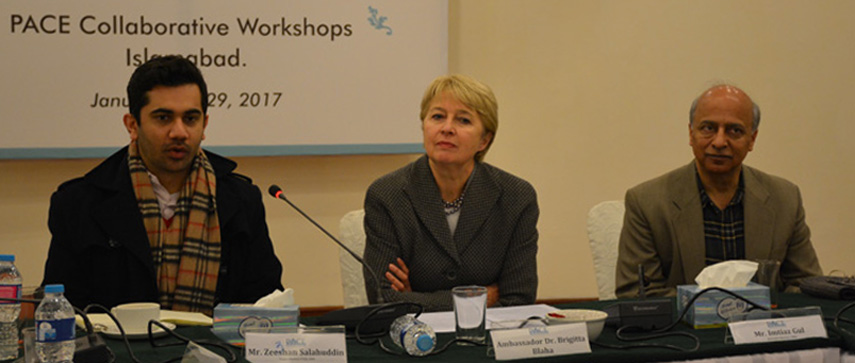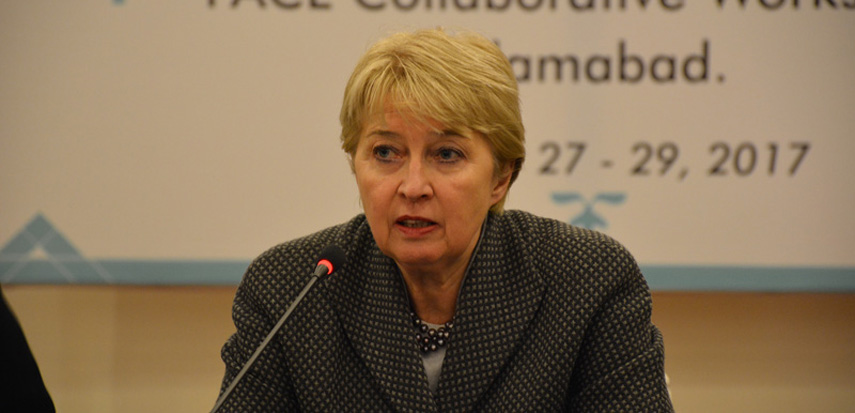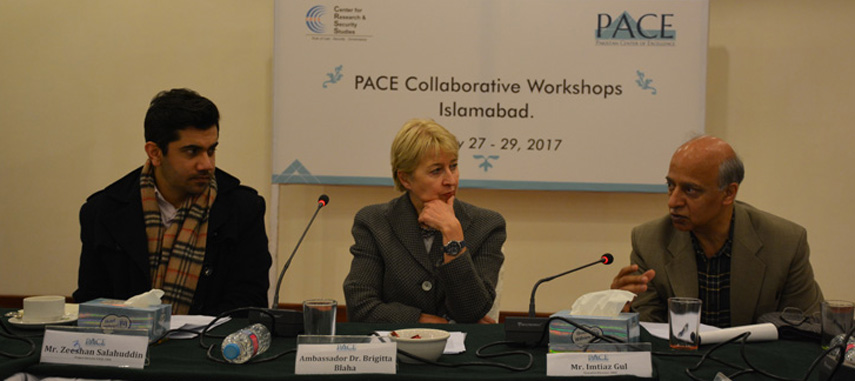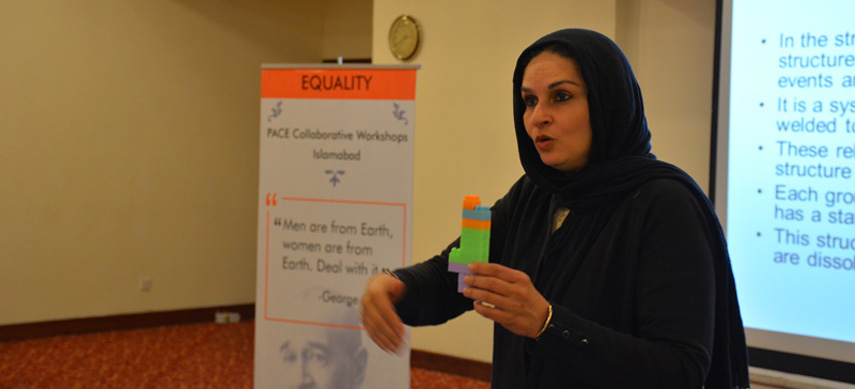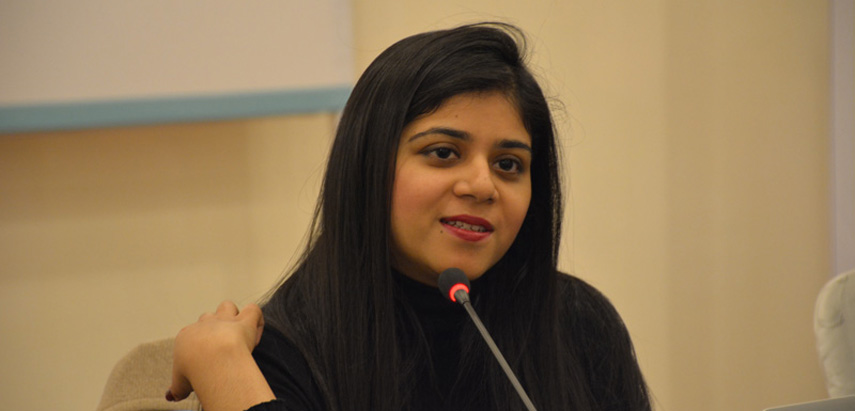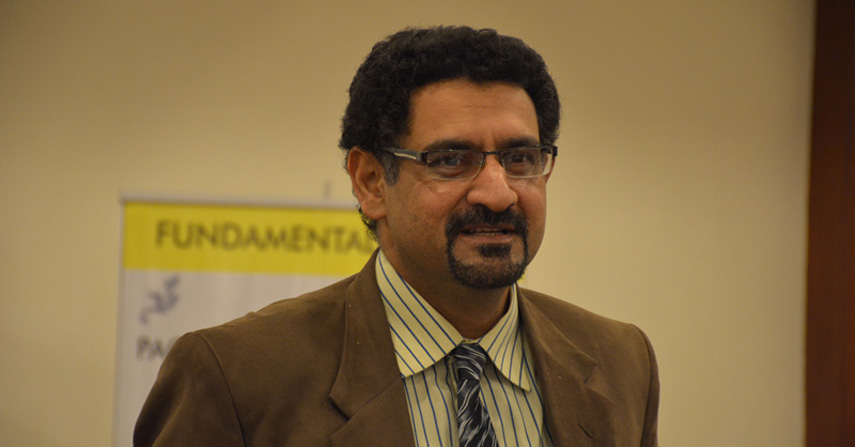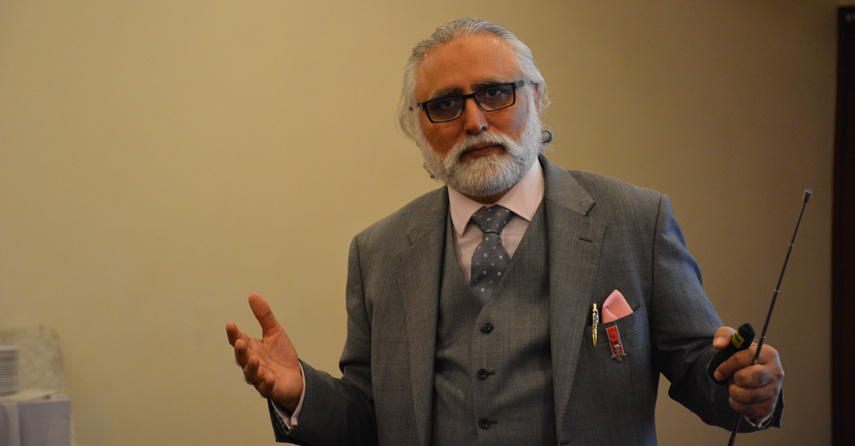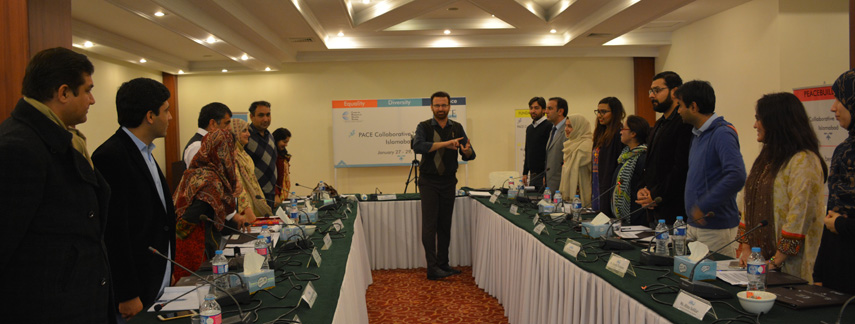The Center for Research and Security Studies (CRSS) conducted the 12th three-day PACE Collaborative Workshop for young university lecturers and professors from January 27 – 29, 2017, at Hill View Hotel, Islamabad. Participants included young lecturers and professors from University of Balochistan, Quetta, University of Lahore, Islamabad Campus, University of Management and Technology, Lahore, Karakoram International University, Gilgit Baltistan, Shah Abdul Latif University, Khairpur, Bahria University, Islamabad, International Islamic University, Islamabad, Haripur University, Haripur, University of Azad Jammu and Kashmir, Muzaffarabad, University of Gujrat, Gujrat, University of Sargodha, Bhakkar Campus, and the University of Agriculture, Peshawar.
Dr. Qibla Ayaz trained the participants on the fundamentals of democracy, governance and accountability, Ms. Humaira Masihuddin had a session on multiculturalism and pluralism with special reference to Islam, Ms. Sophia Saifi, CNN Producer shared her views on media & ethics, Dr. Zubair Ghouri spoke on respect for diversity, opinions and rights, Dr. Toaha Qureshi held an interactive discussion on the responsibilities of civic society in Countering Violent Extremism (CVE) and Mr. Safiullah Gul, suicide attack survivor and Bureau Chief at Dunia News, Peshawar discussed leadership and motivation strategies with the participants.
Opening Ceremony
Mr. Zeeshan Salahuddin, Project Manager, welcoming the participants to the workshop said that the main purpose of inviting a diverse group from all across Pakistan is to gather a wide variety of spectrum from them. Teachers are the real gate keepers of the society because they are shaping future generations and are greatly influencing the lives of their students in multifarious ways. He said that PACE is an initiative by CRSS to counter radicalization, inculcate critical thinking, question preconceived notions and narratives, and embed a national discourse in constitutionalism and rule of law. He insisted on the role of teachers as gate keepers of the future generations equipped with the universal values of adherence to rule of law, respect for diversity, opinions and rights, and ideas of perseverance, coexistence, peace building and tolerance.
Her Excellency, Ambassador Dr. Brigitta Blaha of Austria was the chief guest of the opening ceremony. She shared her views saying that Austria is a landlocked European country with 8.6 million inhabitants’ predominantly Christians. There are 6.2% Muslims and a very meager percentage of Jews and non-believers also.
While speaking about tolerance, the Ambassador shared her views saying that it is the willingness to accept behaviors, beliefs, and ideas that are different from yours. Pluralism is a situation where the people of different origins, religions and races live together in a society. Diversity is recognizing that each individual is unique and comes with specific and unique characteristics and equality indicates that people, in a society, no matter what their background is, should have the same fundamental rights and be equally treated. No one should be discriminated on the basis of their unique characteristics.
She said that these fundamentals principles and values are enshrined in the constitution of Austria. The country has also signed a number of international conventions and treaties (most importantly the UN Declaration of Human Rights of 1948) in addition to the European Human Rights Convention from 1958 – as a member of EU – that also ensures the protection of basic rights. One of Austria’s motto is unity and diversity. She expressed that Europeans get to work for peace but enriched with different cultures and traditions. The EU is often seen as a common market of economic entity but the most important element of the union, according to the Ambassador is, the achievement of peace on the continent. There is a Constitutional Court of Human Rights and people can access it if they feel their rights are being violated, she stressed.
The Ambassador further expanded her views from the Austrian perspective saying that fundamental rights are subjected to certain restrictions but these restrictions must be justified. There are certain laws that infringe upon basic rights of freedom that again go back to the experiences of the country during the Nazi regime. There was a feeling that such atrocities should never happen again. In order to avoid the spread of intolerant ideologies, there are boundaries with regards to ‘acceptable expressions.’
Imtiaz Gul, the Executive Director CRSS also shared his views saying that the primary objective of the workshop is to trigger critical thinking through a discourse anchored in fundamental global values such as socio-political diversity, acceptance of diversity, rule of law and equal citizenry. The idea is to create a critical mass of young leaders equipped with the skills to critically analyze issues, look at each other as equal citizens, and correct misconceptions about marginalized communities.
Workshop Core Areas
- The young professionals were trained in following areas:
- Leadership and motivation
- Equal citizenry and respect for rule of law
- Fundamentals of democracy, governance and accountability
- Respect for diversity, opinions and rights
- Rights of minorities and other marginalized groups
- Constitutionalism, and adherence to Pakistan’s Constitution, particularly articles 8-28
- The importance of asking critical questions in the pursuit of knowledge
Dr. Qibla Ayaz
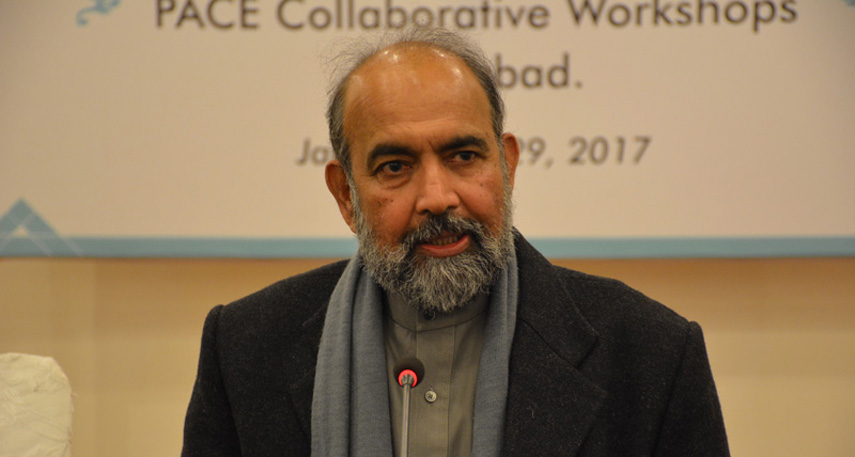
Dr. Qibla Ayaz kicked off the workshop’s first session on the first day and discussed the topic of ‘Fundamentals of Democracy, Governance and Accountability.’ He stimulated the discussion relating it to the current socio-political situation of the Pakistan in wake of Panama Leaks, NAB, and accountability commissions. He also compared and contrasted the new form of electoral democracy that has taken birth in USA, entirely different from that of eight years back election when Obama was elected. Now USA is more focused on localization by restricting the domestic politics to white people.
He took the participants back on the history of democracy that has evolved through different stages. Citizens have experienced different forms of governments in the past such as aristocracy, dictatorship, and dictatorship of the religion. Islamic history has also gone through the same phases; such as dynastic rule by a few families. Across these historical phases, democracy has emerged as the best state system. Among other forms of democracy are parliamentary and presidential systems.
Fostering discussion around aspects of democracy i.e. outward and inward appearances, he said that the outward appearance is the structural election process whereas inward appearance deals with the accountability of the representatives of the people. The inward appearance is the spirit of the democracy. Accountability is a prerequisite for democratic systems. Talking about lack of sustainability of democracy in Pakistan, he said that democracy has not failed in Pakistan but it has always been portrayed as a failed system. Democracy stabilizes with able leadership and this is what Pakistan lacks. Good governance can emerge only if democracy is mature and stable. Good governance is based on social justice, rule of law, and provision of fundamental human rights.
While responding to a question regarding minority rights, Dr. Ayaz said that “According to the Constitution of 1973, all the citizens are equal and should be equally treated under the state laws. Minority rights should be protected as it is one of the most important elements of governance.”
One of the participants commented that “We can only progress and develop as a nation if we are informed and aware of democratic procedures and have the ability to make the elected government responsible and accountable.”
Ms. Humaira Masihuddin started the second session of the day speaking on the theme of ‘Pluralism and Multiculturalism’. Human beings belong to one origin and one place, she said, and no purely homogeneous society exists in the modern world. Most societies consist of different ethnic groups. We may define minority as a group of people who are singled out from the other groups and are treated differently because of their physical or cultural characteristics. Minority is a subordinate group as opposed to the dominant group.
The concept of multiculturalism revolves around a society with heterogeneous beliefs and set of ideas. Multiculturalism makes a society diverse. Respect for diversity shapes coexistence, peace, and harmony under a political and institutional framework. Differences are not challenges and do not impose any limitation on the growth of an individual or society. Every individual has a right to be different and be respected by all. In Islam, the concept of diversity is clearly inclusive, she continued. In the Quran, she said, humans are addressed to treat one another without any discrimination and respect each other’s beliefs and should never use abusive language or show disrespect towards others. If we look at the character of the Holy Prophet (PBUH), it is evident how He always respected the non-Muslims in Mekkah and Medina. Even on the day Mekkah was conquered by Muslims, the Prophet (PBUH) forgave all His enemies for the harms that they had inflicted on Him. Ms. Humaira also made note of the last sermon of the Holy Prophet that said “All mankind is from Adam and Eve, an Arab has no superiority over a non-Arab nor a non-Arab has any superiority over an Arab; also a white has no superiority over black nor a black has any superiority over white except by piety (taqwa) and good action.” In short, Islam is the religion of tolerance and coexistence, love and peace for others regardless of their religions or ethnicities.
Responding to a question regarding discrimination on the basis of color, race and religion, she referred to a verse from the Holy Quran: “O mankind, indeed we have created you from male and female and made you peoples and tribes that you may know one another. Indeed, the most noble of you in the sight of Allah is the most righteous of you. Indeed, Allah is all-knowing and acquainted”, Surat Al-Hujurat [verse 13].
Ms. Sophia Saifi, anchor and producer at CNN, addressed the participants on the topic of ‘Media and Ethics’. She initiated the discussion with a brainstorming session on participant’s view of media ethics. The participants expressed that the media doesn’t follow ethical guidelines, excessively interferes in the private lives of people, ridicules them, exaggerates the facts, creates sensationalism, reports in a biased or partial manner, and repeatedly reports issues of lesser importance.
After the brainstorming session, Ms. Sophia said that if you go to the core of these issues, you can see that there are very young and untrained reporters in the field who do not have much field experience to report ethically and appropriately way in chaotic situations. The root cause is either the lack of resources with the media to train and capacitate these reports or the indifference to do so rather than media’s pre-designed agendas. She insisted that the media is bound to follow moral compulsions during reporting.
She also said that being neutral and presenting authentic news is one of the values that should be kept in mind while reporting certain issues. Media is bound in some cases and cannot be open and expose the facts. She said that words are sometimes misinterpreted and other times twisted when reporting sensitive issues; therefore, extreme care should be taken while debating on such issues. She also said that the reporters while broadcasting should use decent language.
Dr. Zubair Ghouri expanded his views on ‘Respect for Diversity, Opinions and Rights’. He said that as citizens of Islamic Republic of Pakistan, whenever we talk about humanity and humanitarian affairs, we are closely linked with the Islamic concept of human rights and equality. The constitution of Pakistan guarantees equal rights to all the citizens but the preamble restricts equal citizenry by defining the concept of divine sovereignty. There are some minority groups who don’t believe in divine sovereignty and on the basis of their beliefs, the constitution deprives them of the concept of equal citizenry.
Dr. Toaha Qureshi was the first speaker of the last day and spoke on the topic of ‘Responsibilities of Civic Society in Countering Violent Extremism: a Community-led Approach’. Referring to the two major incidents of 9/11 and 7/7, he said that the entire world is suffering from the menace of terrorism and extremism. The issue, hence, having an international aspect and being multi-dimensional, needs a multi-dimensional addressing approach. He discussed various models that can deal with extremism.
Being a resident of Pakistan and Britain, he said that he has experienced that like many other parts of the modern world, these two countries also face the challenge of radicalization that requires a creative, multi-pronged addressing strategy. The strategies vary from country to country. It is a strong belief in the UK that radicalization has to be tackled by the society itself through preventative and rehabilitative measures rather than military and war-like action. This is done through a social and religious mentoring process involving free education, skill-based training, and employment & business opportunities.
The first prong of UK’s counter-radicalization programme is the ‘Triangular Model of Engagement and Containment’. In this model, the community at large leads on building relationships and works with the police and local government as partners to tackle problems such as social exclusion, extremism, etc. In the first prong, the problem is identified and owned by all the stakeholders. In the second prong, a collective attempt is made to implement workable solutions through capacity building measures. These measures include social behavioral transformation, enhancing educational attainment and creating employment opportunities. The third prong is the ‘Early Prevention Model’. A host of measures are adopted to prevent disenfranchised people from becoming radical and extremist at an early stage by offering them safe places to raise their concerns. The fourth prong is the Rehabilitation Model. The wider society and affected community assumes collective responsibility for rehabilitating violent extremists and terrorists so that they become an effective part of the mainstream society.
There are several causes responsible for extremism in Pakistan; foreign policy, prejudices, class distinction, sectarianism, discrimination, poverty, unemployment, illiteracy, distrust of government, lack of civic responsibilities. All these causes can be diminished only if we as individuals start realizing our responsibilities and work together for the betterment of the society.
Mr. Safiullah Gul was the last speaker of the workshop and spoke on the topic of ‘Leadership and Motivation’. He began with the saying that “he who fails to plan actually plans to fail” and shared stories of people who alone have changed the course of history, with motivation and persistence, despite all the opposition.
He said that successful leadership determines the extent of efforts directed towards a certain goal. He presented his model of goal-seeking i.e. activation, persistence and intensity. Being alone doesn’t actually matter if you have goals and objectives set in your mind. To achieve these goals, you actually need to overcome your fears and insecurities. An individual sometimes can set an example and be motivation for others.
A participant commented that “We have to overcome our fears to achieve our goals in life”.
Another participant commented that “Motivation is always needed to move forward”.
His session, filled with activities to enhance creative and critical thinking, focused on looking at things from a slightly different perspective to encourage problem-solving.
Mr. Zeeshan Salahuddin in his closing remarks said that said that it was important to inculcate critical thinking in our youth, and to equip them with the art of questioning the narratives they have been given. He said that teachers were the gatekeepers of our future, and had the ability to shape an entire generation’s mindset to propagate tolerance, diversity and equality. He shared that the participants need to conduct these activities with their students to inculcate adherence to the rule of law and equal citizenry. CRSS provides financial and logistic support in this regard to lecturers and professors so that they can foster the universal ideals of tolerance and diversity in the young generations.

